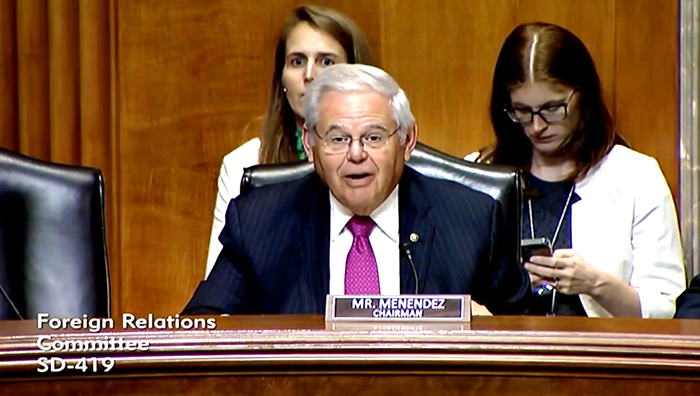WASHINGTON, DC – Today, U.S. Senator Bob Menendez (D-N.J.), Chairman of the Senate Foreign Relations Committee, announced the introduction of key foreign policy amendments to hold Azerbaijan accountable for its aggression against Armenians both in Armenia and Artsakh (Nagorno Karabakh), pursue accountability for alleged war crimes, and halt exports of military equipment to Baku.
Amendment Ending 907 Waiver
“Less than a year after Azerbaijan’s assault on eastern Armenia and more than two hundred days into the Aliyev regime’s blockade of Nagorno Karabakh’s indigenous Armenian population, it is clear that Azerbaijan has both used offensive force and continues to blockade vulnerable Armenians,” said Chairman Menendez. “Annual use of the 907 waiver violates the spirit of the Freedom Support Act. Moreover, given Azerbaijan’s aggressive behavior, it is clear that conditions for use of the waiver are not being met, including certification that use of the waiver will not enable offensive actions against Armenia. Given this mockery of the law, it is high time to end the waiver through the National Defense Authorization Act process and pressure Baku to finally end its aggressive actions toward Armenians. I stand with the people of Nagorno Karabakh, who are facing the threat of famine, and the people of Armenia, who continue to recover from their own trauma as a result of Azerbaijan’s incursions into their homeland.”
This amendment prohibits the continued use of an exemption waiver of Section 907 of the Freedom Support Act, which has been the law since 1992, and bans most assistance to the Government of Azerbaijan until it takes demonstrable steps to cease all blockades and other offensive uses of force against Armenia and Nagorno Karabakh.
Amendment Calling Out Azerbaijan’s Human Rights Violations
“Security guarantees for the people of Nagorno Karabakh are essential for any lasting peace in the South Caucasus,” said Chairman Menendez. “Without justice, there can be no peace. That is why I firmly believe we must pursue investigations into all alleged war crimes. Moreover, we need to apply pressure to the Aliyev regime to prevent future war crimes, including through sanctions for those responsible.”
This amendment urges an end to Azerbaijan’s blockade of Nagorno Karabakh, calls for security guarantees for Nagorno Karabakh, calls for investigations into Azerbaijani war crimes, and expresses support for sanctions as a tool to hold accountable those complicit in human rights violations against Armenians.
Amendment Prohibiting New Export Licenses for Military Equipment for Azerbaijan
“Earlier this year, I expressed deep concern as the Department of Commerce considered the export of rifles to Azerbaijan,” said Chairman Menendez. “Amidst Azerbaijan’s ongoing aggression, consideration of this type of export is unacceptable. It is time to remove ambiguity from the equation, and make it clear that these types of exports are not allowed while Azerbaijan’s aggressive behavior continues.”
This amendment prohibits the authorization of any new export licenses for firearms or other offensive security or military equipment for the Government of Azerbaijan until presidential certification that Azerbaijan has ended offensive use of force against Armenia and Nagorno Karabakh.
ACA Chairman Sevak Khatchadorian expressed deep appreciation for Chairman Menendez’s introduction of these significant amendments. Khatchadorian pointed out that Azerbaijan has persistently launched attacks on Armenia, committed war crimes, and is currently imposing an unlawful blockade on Artsakh for more than 222 days. This blockade, enforced by the Aliyev dictatorship directly violates the International Court of Justice’s ruling from February 2023, which mandated Azerbaijan to ensure free movement along the corridor. “Hence, it is crucial for the United States Administration and Congress to stand in support of the citizens of Artsakh and demand that Azerbaijan’s leadership immediately open the Lachin Corridor, halt its ongoing ethnic cleansing program and human rights violations in the region.”
The Lachin Corridor, connecting Artsakh with Armenia, serves as a vital lifeline for the more than 120,000 indigenous Armenian residents of the region. It has been a critical artery for the movement of goods, services, and humanitarian aid. The blockade of this corridor not only poses severe challenges to the daily lives of the inhabitants, but also restricts their access to essential resources, medical supplies, and life-saving medical services. The blockade has already contributed to the civilian deaths of Artsakh’s elderly and children. To date, more than 1,610 citizens have been deprived of necessary medical treatment due to the suspension of planned surgeries in all medical facilities in Artsakh. Around 3,900 people including 550 children have been separated from their homes due to the blockade, around 11,000 people have lost their jobs and income due to the economic impacts of the blockade, and it is estimated that the Republic of Artsakh’s economy has lost more than $409 million marking a 45% decline in its annual GDP.










